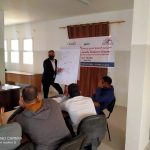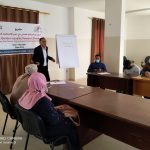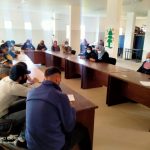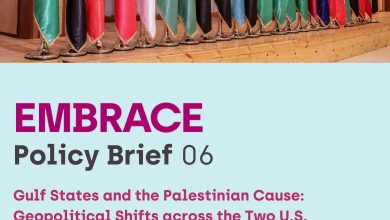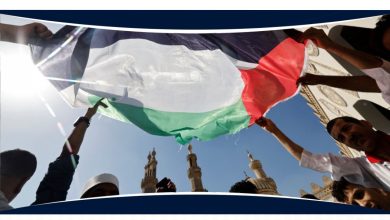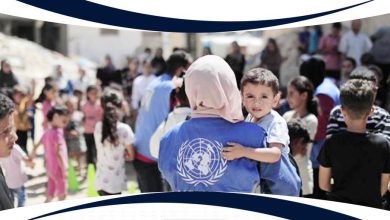Pal-Think for Strategic Studies Is Implementing A Series of Awareness-raising Meetings on Elections and The Electoral Process.

Pal-Think for Strategic Studies carried out a series of awareness-raising meetings on election issues and topics in collaboration with civil society organizations, within the framework of a project “Young Gender-equality Research Chapter- phase 2: Empowering Civil Society Role to Achieve Palestinian Elections”. It is worth noting that those meetings were funded by the Government of Canada. Those meetings came as a part of Pal-Think’s main responsibility in empowering youth from both genders and enhancing their awareness and knowledge of the electoral process hand in hand with emphasising the role of civil society in Palestinian elections.
The first meeting was held in the National Assembly for Democracy and Law in Rafah province, entitled “Stages of the electoral process and oversight mechanisms,” with the presence of a number of observers.
The meeting was moderated by Mr Bilal Al Najjar, lawyer, who opened the session by talking about Pal-Think’s efforts with youth. Then he emphasised that this meeting was part of the ongoing Pal–Think’s efforts to promote and empower civil society, especially with young people, in various areas and issues.
After that, Mr Bilal spoke about the application for and legal duration of the legislative election, the conditions for the nomination of the electoral list, the conditions for the candidate of the electoral list, the annexes to the application for the nomination of the list, the amounts and objectives of the insurance, and when they could be recovered.
Besides, he highlighted the mechanisms for considering the application for election, when the electoral list is rejected and the effect of such rejection if it is on one or more candidates on the list or on the list as a whole, and how the decision to reject can be challenged and appealed against.
Mr Al Najjar then spoke about the publication of the first and final disclosure of electoral lists and candidates, the mechanisms for the filing of electoral appeals and the legal provisions relating thereto, the cases of withdrawal of candidates and the legal period in question.
The session also discussed the process of monitoring the electoral process by defining it and indicating its objectives, the types of observers, clarifying the functions, duties, responsibilities and rights of observers and the criteria to which observers must adhere. Hence, the monitoring mechanism, reporting and complaints and monitoring of irregularities during the electoral process were explained.
The second meeting was entitled “Women’s Political Participation” at the Al-Hayat Centre, Part of the Centre for Research, Legal Advice and Protection of Women, in the presence of a number of women. The meeting was moderated by Ms Tahany Qassem- Hayat Center Programs Coordinator- who, in turn, provided a conceptual framework for the meaning of women’s political participation and the relationship with the positive and negative realities of Palestinian women. She further explained how elections could serve as a representation for this.
Ms Qassem also illustrated the relationship between women’s view of political participation and actual impediments from the perspective of gender roles in Palestinian society, as well as the forms of women exercising their political rights through the process of standing and contesting elections, and explained the women’s quota electoral system.
The third meeting, entitled “The Role of Civil Society in the Success of Elections,” was held at Bait Almostuqbul Association in East Khanyunis with the presence of a number of young people of both genders. The meeting was moderated by Dr Khytam abo Ouda, Academic and researcher in social and political sciences, she spoke about the role of civil society in monitoring the electoral process in all its stages, thus indicating its concept and importance in promoting political participation, the importance of the role of the local observer on polling and screening day, and the need to harmonize electoral centres for persons with disabilities.
The fourth meeting, entitled “Components and stages of the electoral system,” was held at the Al-Aqsa Sports Club in Nuseirat, in the presence of a number of young people of both genders. The meeting was moderated by Dr Samia Al-Ghsean, Professor of Public International Law who spoke about the importance of holding general elections and their role in promoting the concepts of democracy and citizenship.
She also pointed out the basis of the electoral system for the current 2021 general elections (full proportional representation system) and indicated the stages of the electoral process from registration in the voter register to the announcement of results.
The fifth meeting was carried out at the Alataa Charity Society in Beit Hanoun, entitled “Election Success Mechanisms in Divided Communities,” attended by a number of young people of both genders. The meeting was moderated by Dr Talal Abu Rakba, Analyst and political researcher, spoke on the role of the citizen in fulfilling the electoral process as a mechanism for democratic transformation. Dr Talal further explained the citizen’s role in restoring political and social integration within divided societies, due to Hamas- Fatah split.
He also stressed the Citizen’s role in restoring national identity and thus indicating the extent to which the amended electoral system could reflect the genuine representation of all segments of society and restore the socio-political contract based on the promotion of the values of citizenship in Palestinian society.
As for the sixth meeting, it was carried out at the Palestinian Institute of Communication and Development, entitled “The Role of the Press and the Media in Fighting Hate Speech,” moderated by Mr. Fathi Sabbah, Director of Birzeit Media Center, in the presence of a number of journalists of both genders. The meeting focused on the role of journalists in combating hate speech in the context of elections, the impact of the democratic process on the Palestinian decision, the awareness of journalists about their rights, the need to insist on holding elections, and the importance of checking the news to avoid spreading rumours.
Among the meetings were a series of questions, interventions and queries raised by the attendees and were answered by the moderators.
The designations employed and the representation of material in these meetings do not imply the expression of any opinion whatsoever on the part of the Government of Canada.”

